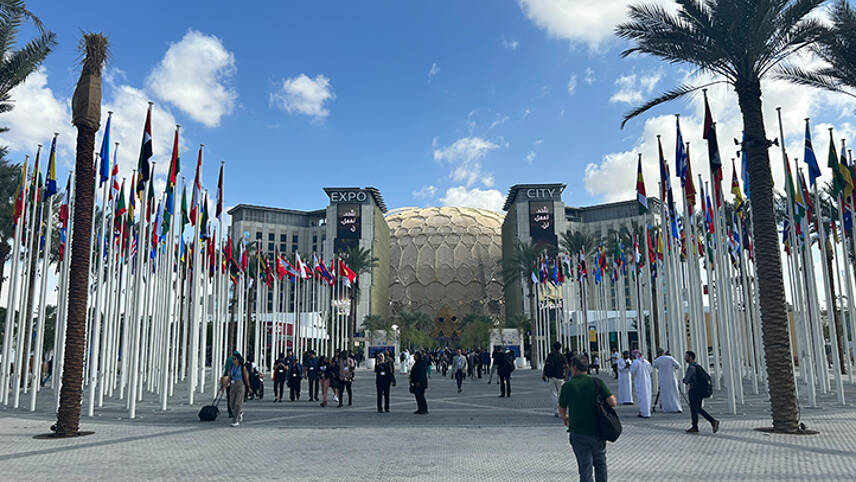Register for free and continue reading
Join our growing army of changemakers and get unlimited access to our premium content

Image: Luke Nicholls for edie
The letter was convened through the B Team, a global nonprofit initiative co-founded by Sir Richard Branson and Jochen Zeitz in 2012 and supported by the likes of Paul Polman, Mary Robinson, Arianna Huffington and Christiana Figueres. The B Team was set up to advocate for bold business action on climate, backed by enabling global frameworks and policies.
As the second week of COP28 gets underway in Dubai the B Team has today (8 December) sent a letter to COP28 President Sultan Al Jaber explaining the necessity of delivering 1.5C-aligned outcomes at the climate conference.
Signed and supported by more than 800 business leaders and climate advocates – including 300+ chief executives, 240+ NGOs, and 70+ climate scientists – the letter calls for COP28 to deliver multiple “tipping points” that turbocharge a global transformation that realigns the planet with the 1.5C pathway of the Paris Agreement.
“The world and its people need the strongest possible outcome to keep 1.5C within reach. But delivering on this historic task requires us to act like a team,” the letter states.
“The signals of transformation and opportunity across sectors and society are all around us. At the same time, the climate emergency is biting harder than ever. It’s up to us to seize this opportunity – because what is achieved here in Dubai must mark a legacy moment which determines the fate of our future generations.”
The letter lists three crucial tasks that must be delivered during the final week of negotiations at COP28.
Firstly, it calls for an “orderly phase-out of all fossil fuels” in a way that is just and aligned with the 1.5C trajectory. This should be combined with the ambition to triple global renewable energy capacity by 2030 from 2022. During the opening week in Dubai, more than 100 countries signed up to a commitment to keep the 1.5C pathway of the Paris Agreement alive through the tripling target.
Additionally, the signatories want an “enabling environment” set up through policies and markets that enable public and private finance to shift toward green solutions.
The signatories also call on world leaders to ensure that deforestation is halted and reversed so that biodiversity is championed by 2030.
Global Stocktake
The letter states that COP28 will need to deliver the required levels of ambition to respond to the Global Stocktake – set to be unveiled this week in Dubai which will outline how off-track the world is to deliver the Paris Agreement, and what new mechanisms agreed upon by world leaders can help avert this trend.
Prior to COP28, the UN warned that current national commitments to deliver the Paris Agreement remain “insufficient” with global emissions only on course to reduce by 2% by 2030, compared to a scientific pathway of more than 40%.
The report warned that national climate plans are not on course to limit global temperature rise to 1.5C, emphasising that much more action is needed from nations at COP28 and beyond to radically cut emissions.
The UN analysed the NDCs of all 195 Parties to the Paris Agreement, including 20 plans that are either new or have been updated as of September 2023. However, the report found that current commitments will deliver an increase in emissions by 8.8% compared to 2010 levels – a slight improvement compared to last year’s assessment of a 10.6% increase by 2030.
In stark contrast, the UN’s Intergovernmental Panel on Climate Change (IPCC) recommends that emissions need to be cut by 43% by 2030 compared to 2019 levels. As such, there is a more than 40% deficit that nations need to address through updated climate action plans.


Please login or Register to leave a comment.